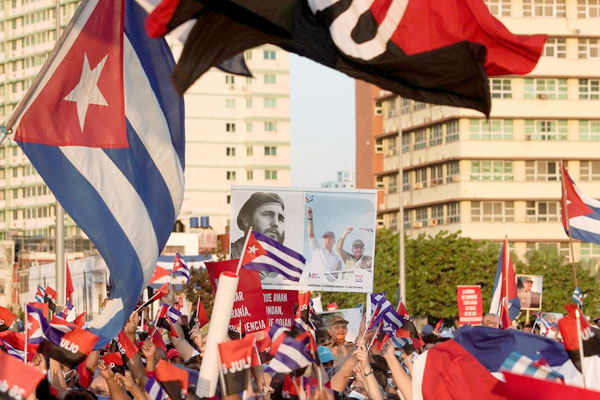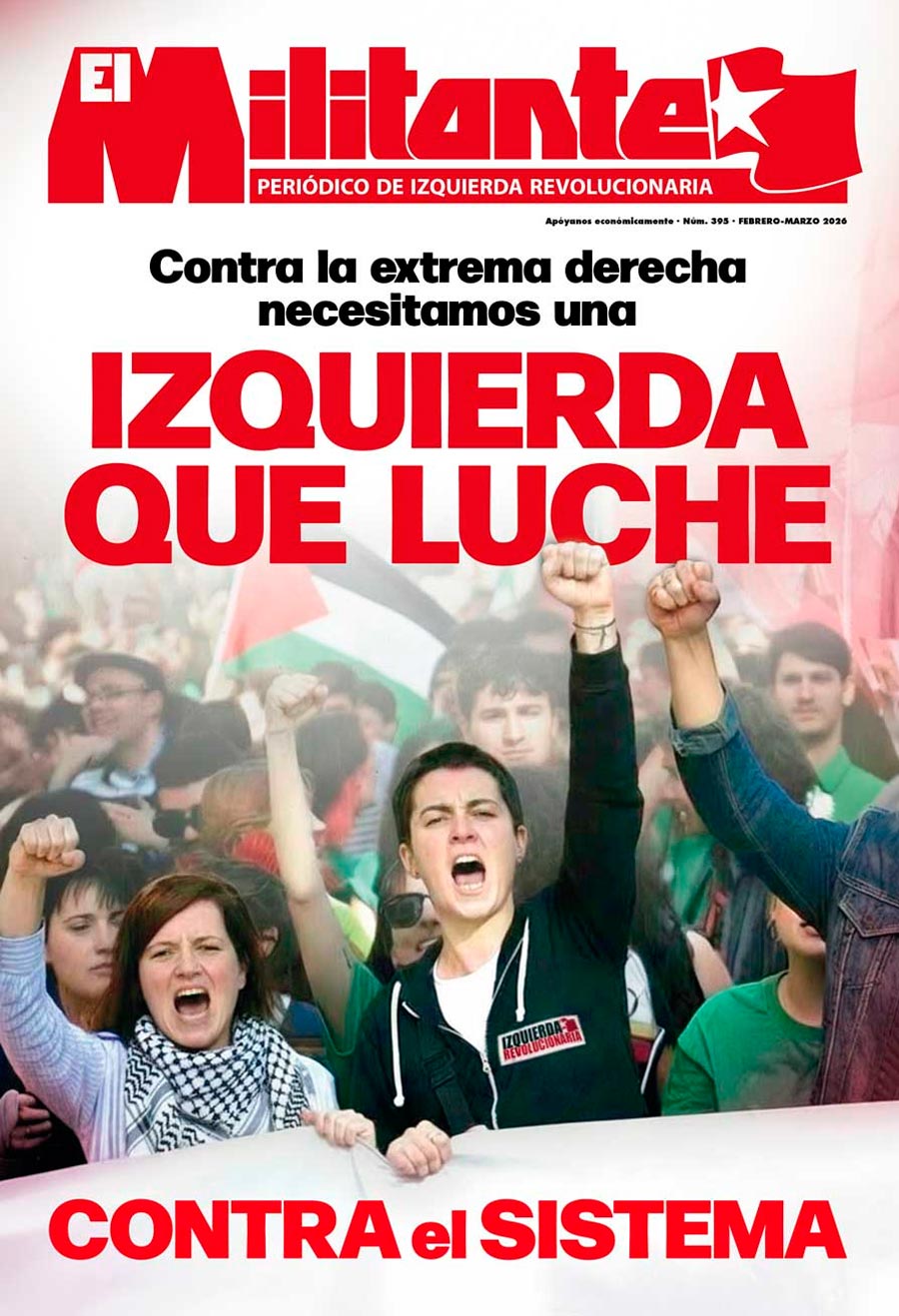Cuba finds itself again at the centre of the storm. Since the past Sunday, 11th of July, with the occurrence of several demonstrations in various towns and villages, with participants, the apparatus of western propaganda has kicked up in top gear. Cuba is a dictatorship, proclaim the same people that support criminal regimes such as the “democrat” Ivan Duque in Colombia and Sebastian Piñera in Chile- regimes that responded to the popular demonstrations in their countries with a brutal repression which led to dozens of deaths, hundreds of injured people and thousands detainees.
Duque, Piñera, and many others, defenders the interests of the oligarchy and big American and European monopolies which govern these countries with an iron fist, are at the head of what capitalism happily accepts as “democratic” governments. Cuba, however, they call a dictatorship! We only need to dwell for a moment on these double standards to understand the objective of imperialist propaganda.
In the US, the racist abuses and killings perpetrated by the police are an everyday occurrence, with the demonstrations rising to protest against these killings and demand justice facing severe repression, with thousands of people arrested.
In the Spanish State, the great majority of the protests called by the combative left and youth are ferociously repressed, and the judges do not hesitate in sentencing and imprisoning twitterers, rappers and anyone that publicly expresses an opinion which can be seen as subversive through the prism of the ’78 regime. What is happening during the struggle of the Catalan people for the republic and the right to decide says it all.
All of these governments, international organisations, media… as well as the political leaders at the beck and call of the capitalist powers, amongst whom the leaders of the social-democrats across the world play an especially deplorable role, tear their hair and wail about the lack of “democracy” in the Caribbean island. In the meantime, they keep friendly relations with murderous and brutal regimes such as the ones in Morocco, Saudi Arabia, etc. and show their support to the barbaric repression used by the Zionist state to crush the Palestinian people.
No communist, no revolutionary Marxist can fall into this trap, either actively or passively. It is essential to maintain an internationalist position, a firm rejection of the imperialist blockade and the capitalist propaganda.
But the genuine friends of the Cuban Revolution are distinguished not for adopting a gregarious and coat-tailing attitude, hiding the problems and criticisms in moments of difficulty, but by understanding the class nature of these problems, its fundamental implications and providing an alternative to neutralise them.
The lessons of the collapse of the USSR and the breakup of the deformed worker states of Eastern Europe, the reimplantation of the market economy which followed this process, the violent political reaction towards the right and the creation of bourgeois bonapartist regimes in the majority of the aforementioned countries are a serious warning for what can happen to Cuba and how much is in stake.
Economic collapse
The events of the 11th of July started with a demonstration in San Antonio de los Baños, a city located 26 kms to the southwest of Havana. The reason was solely to protest against the various electricity cuts suffered by the population for months, the scarcity of essential supplies and the inflation that strikes the most disadvantaged layers.
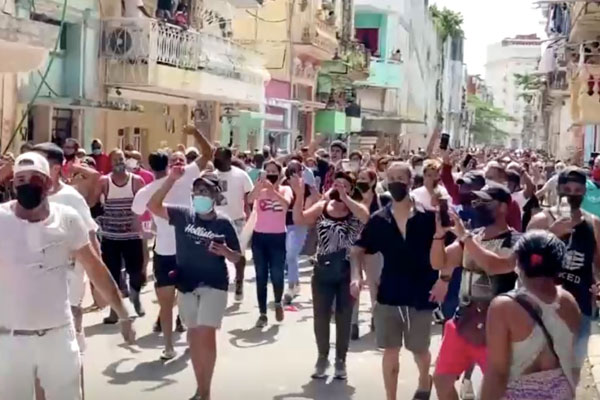
This mobilisation was quickly broadcast through social media and various other demonstrations broke out in a number of places, including in Havana, where 6000 people participated.
Of course, in the capital overtly counterrevolutionary elements showed up, led by the exiles of Miami. But there were popular layers, not part of the groups unleashed by imperialists, who made their weariness at daily surviving conditions, which get more unbearable by the day, known..
What is the underlying cause of this discontent? Can we say that it is happening only because of the manoeuvres of the cuban right-wing and United States imperialism? If that was true, this would have been a mere superficial episode, easy to contain. But it does not seem to be the case.
The Cuban Economy has been holding against a brutal pressure for decades, and the difficulties have become even more acute with the outbreak of the global pandemic. According to data from progressive US media, on the last two years alone the Cuban Government saw their main sources of income and foreign currency evaporating in the air. The tourism sector is in ruins, and the income from this activity has been reduced in 3200 million dollars.
The consequences of the blockade sponsored by US imperialism have also become more acute.The Trump administration not only cancelled Obama’s shy overtures- taken in order not to be sidelined in the capitalist investment on the island by Europe and Canada, and to accelerate a transition to market economy- but it rabidly worked to impose maximum pressure and damage on the island.
The Republican president concocted a legislative package to make impossible the sending of money from Cuban people resident in the US to their families. This package has led to the decrease of a further 3500 million dollars in income and currency. But not only that- the Latin American governments in Washington axis have quickly annulled the health services contracts they had with Havana, worsening the crisis in the acquisition of currency.
This offensive against the Cuban people has remained during the Joe Biden’s democrat administration. The new president has not softened the criminal blockade, not even an iota, and does not want to stir up the Miami exiles after losing the last election in the city. This is the character whom the international reformist left applauds as the new guru of progressive politics.
The Cuban economy has also been heavily stricken by the changes occurring in Venezuela. We cannot expound too much in this lines, but the pro-capitalist measures of the Maduro government, and the collapse of the Venezuelan productive forces, especially in the oil industry, has resulted in the drastic decrease in cheap oil that Cuba received from Chavez and which was allowed to resell in order obtain currency.
Why is it so important the flow of strong currency to Cuba? The answer is simple. The international division of labour rules all. The island is not self-sufficient: it needs to import more than 60% of the basic food products, a percentage that is surpassed when it concerns industrial, technological and pharmaceutical raw material. Without dollars, imports have suffered a brutal reduction of more than 40% in 2020, a figure that may increase in 2021.
These factors, which compound a huge weight, have been deepened by the course taken by the leadership of the Communist Party of Cuba, which was reinforced in their VIII congress last April.
The strategy of re-establishing capitalist relations not only buries economic planning, but also leads to a great social stratification, the growth of internal inequality and a rise of inflation that afflicts the popular layers.
This orientation leads to the growth of a rejection of socialist ideas in the popular layers, favours the growth of petty-bourgeois, individualist, “save yourself” tendencies and promotes a double moral and double-speak: the one on official speeches and daily practice.
The revolution and the bureaucratic deformations
On the same 11th of July, the Cuban president, Diaz Canel, insisted, in a television address, that the protest had been staged by a minority, what had happened had been a product of the subversion fed by the United States and appealed to the population to come out on the streets and demonstrate to “defend the revolution”.
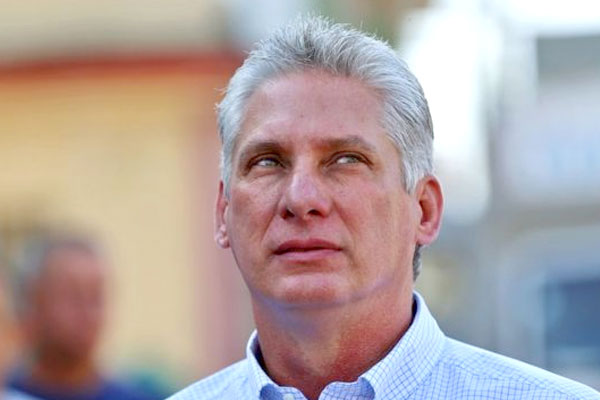
The government enacted measures which aimed to stem the growth of the protests: it ordered the suspension of internet and deployed the police, leading to numerous arrests, although there are no official numbers. The majority have already been released or are under very light-touch house arrests: it is the case of the Spanish right-wing newspaper ABC reporter, who has been able to keep in contact with the whole world to denounce the “Cuban dictatorship”.
It is an obvious joke to compare these “repressive” measures to what happens in other Latin American countries when there are mass protests. In fact, the Cuban government is stepping on eggshells, because it knows that resorting to forceful measures of a higher magnitude would give ammunition to the imperialists, and would extend and not dampen the discontentment.
Answering the call of Díaz Canel, thousands of persons demonstrated on the streets of Havana on Saturday the 17th of July. This demonstrations, which were named by the government as a “spontaneous revolutionary reaffirmation”, in which, apart from the sectors that participated in a conscious and active manner, state and party functionaries and state workers called and supervised by their superiors also participated, are not a reliable factor when weighing the real support of the Cuban government and the CCP leaders.
And this is one of the issues that explains the latest events. There is no doubt that, in spite of the economic difficulties, the revolution still enjoys a significant support from that part of the working-class which lived through Batista’s dictatorship and specially the heroic years of the revolution, when the big victories of the planned economy- despite the bureaucratic deformations of the workers state- led to the betterment of the living conditions and to colossal social conquests.
But one thing is the authority still commanded by the revolution, and a very different thing is the opinion of the working-class, the people in general and the youth in particular, regarding the current leaders of the Cuban Communist Party and the high-ranking state bureaucrats.
The official political discourse is not just totally disconnected with the youth, but it repels a majority of them. The curbs to freedom of expression, the bureaucratic surveillance and control that is imposed on creative activity not only affects and brings complaints from the intellectuals; it specially strikes the youth that feel their initiative derailed and stunted in this ominous atmosphere.
On the other hand, that bureaucratic marxism, dead and stagnant, from the same cloth that was “studied” on the old USSR and the remainder of Eastern countries, which repels the majority of the Cuban working-class, finds the most absolute rejection.
This disaffection is the fruit of too many arbitrary rules, the waste, stealing and corruption in the process of production and distribution which are inherent to a planning regime which is bureaucratically managed and where the working class has no chance to participate either in the elaboration or execution of its plan, nor to democratically intervene, control and direct the state institutions.
It is the state and party bureaucracy which imposes the decisions, with the working-class having no fundamental chance to influence any of them. And this bureaucracy, conscious of its material interests, much of it demoralised and with no confidence in the abilities of the working-class and youth, is manoeuvring in the opposite direction to the one it needs.
The pro capitalist agenda undermines the conquests of the revolution
In a context of protracted economic crisis and rising difficulties in accessing essential goods and services, and with the cost of living increasing much more than wages and pensions, the privileges of the thousands of functionaries that rule free from any actual control become even more clear and outraging to the Cuban people.
It is not a coincidence that one of the main targets of the 11th July protests were the “Freely Exchange Currency” shops, open a year ago. Only foreign currency is accepted in those shops, which offer a stock of essential and imported products, similar to the special shops in the old USSR where only the CPSU and state bureaucrats and foreign tourists could shop.
But the problem lies deeper. The system enacted last January to unify the peso- the one that was converted in foreign currency and that one that was not and with which wages were paid- and that entailed a decisive step to stabilise the pro-market reforms, has led to an increase in inflation- which can reach 500% this year, according to Cuban economists-and decrease on the real-term income of the majority of the population.
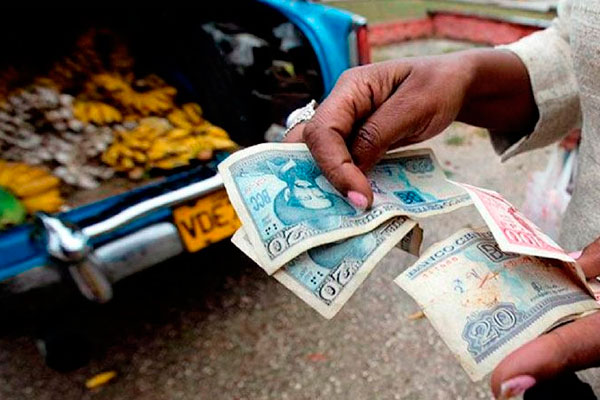
Even layers which were previously excited about the pro-market measures- the vast floating population working in the tourist sectors- have suffered greatly, as the tourism income has decreased exponentially.
A few months ago we made a comprehensive analysis of the government pro-capitalist agenda, inspired in the model of Chinese bureaucracy and state capitalism which was able to stabilise the Asian Giant ("Perspectivas para Cuba. El debate sobre el socialismo y la desigualdad"). The posterior events have essentially confirmed our points of view, making clear the huge clearing that these measures opened for the consolidation of the tendencies of capitalist restoration.
In an attempt to show that they are doing something and enacting measures, Cuba’s government has authorized travellers to bring food, sanitary products and medications without any limits or tariffs until the 31st of December of 2021. But this partial initiative does not solve the underlying problem.
The main question is how to globally face the imperialist blockade and the endemic deficiencies of the Cuban economy from the point of view of Marxist socialism. What policies to apply to strengthen the revolution, definitely neutralise the continuous manoeuvres of the counterrevolution and to completely wipe out the peril, ever more evident, of the victory of capitalist restoration.
A regime of genuine working-class democracy, where the working-class actually leads the economy and the state, is the starting condition to defend the revolutionary conquests and to really advance towards socialism. This entails the elimination of the privileges to the thousands of functionaries that make up the bureaucratic machine. But this is not an option for the party and state leadership..
Discarding genuine workers’ control over economy and society, the measures adopted by the Cuban government to face the economic debilities and the crisis have been pro-capitalist reforms. The consequence is that the economic planning and the state ownership over the means of production have lost terrain against the capitalist productive relations.
The results of this path have quickly bore rotten fruits: an increase in inequality, a gradual dismantling of public services and a decline in the living conditions of the majority of people. Social inequality that, far from being combatted by the Cuban authorities, is justified by the upper echelons of the party, which denounces the state “paternalism”, the “irrational” social spending, the excessive subsidies, etc.
Capitalism is being strengthened and penetrating ever more extensively in the Island economy, with the help of the party and the state apparatus. The high ranks of the army, similar to what occurs in Venezuela and China, take an increasingly active role in the process of economic management and privatisations, obtaining from this role vast wealth, profits and perks. Some reports show that the companies controlled by army members, grouped in the Business Administration Group, SA (GAESA), already control 60% of the economy and 80% of the touristic industry.
The Cuban leaders have, a long time ago, decided to follow on the steps of the bureaucracy of the Chinese “Communist Party”, even adopting the same terminology. The economists serving the Beijing apparatus invented the term “market socialism”, an euphemism drawn to mask the capitalist restoration that they decided to impose with an iron hand, already complete in China for years.
The main objective of the Cuban leadership is to steer with a steady hand the same process followed by their Chinese counterparts. But in the Cuban case, they have to take into account a number of factors that condition its speed and press them into driving carefully.
On one hand, the capitalist advance is linked to the dismantling of the social conquests that allowed for substantial egalitarian reforms and which have shored up the support for the revolution. A misstep might provoke an authentic social explosion and endanger the control that the Cuban leadership wants to keep over this process; from this comes the sonorous official campaign against socialist egalitarianism and the relative slowness in putting the already signed pro capitalist measures into practice.
On the other hand, a factor that hinders the rhythm of pro market reforms, and especially worries the upper echelons of the Cuban Communist Party and the State is the existence, only a few miles from Havana, of the “gusana” bourgeoisie, expropriated by the revolution.
The counterrevolution in Miami, which has huge strength and influence both in the republican and democrat administrations, are thirsty for revenge and if there is a total capitalist restoration they will try to retake their old properties.
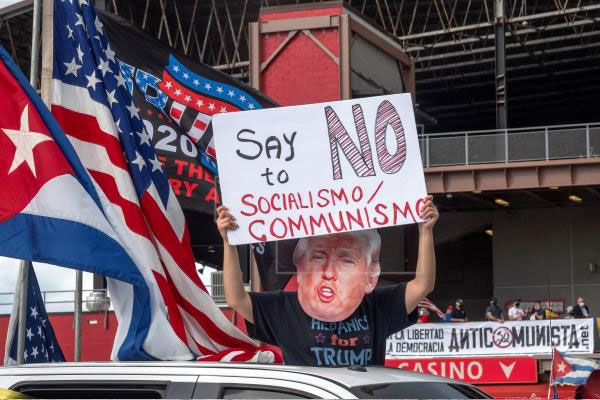
And finally, the capitalist restoration process in USSR and Eastern Europe, and also to great extent in China, took place under the wing of a western economic boom that no longer exists. The model that faces a capitalist Cuba in the current situation is closer to Guatemala, Honduras and El Salvador. And that sows a lot of uncertainty and contradictions amongst whom has to apply measures that might lead to disaster.
What doubt remains that the cuban counterrevolution, both inside the country and in exile, US imperialism and the international bourgeoisie are trying to capitalise on the social discontent, the deepening of the pandemic and the economic difficulties, by attempting to channel it against socialism and the revolution.
In the demonstrations, side by side with slogans against food scarcity or price increases, we could hear clear counterrevolutionary slogans, such as “Homeland and Life”, a slogan used by the “gusanería” in opposition with the slogan “Homeland or death, we will win”, or directly “Down with the Castrist dictatorship”, etc.
The question, therefore, is how to raise a political project capable of facing the merciless material situation in the Island, to stop the pro-capitalist reforms which have deepened the social discontent and to replace the dead weight of the inefficient and privileged administration of the bureaucracy for a socialist democracy where the working-class genuinely and democratically controls the social and economic activity of the country.
Is it possible to break with the isolation of the revolution?
One of the biggest factors to condition and limit the development of the Cuban economy and the strengthening of the revolution is its isolation. History has shown that socialism in one country, apart from being a deeply antimarxist idea, is impossible. In the case of Cuba, an archipelago in the Caribbean with limited resources, this is a thousand times truer.
After more than 60 years, the revolution is still isolated in spite of the various opportunities there was to spread it. For decades Latin America has been periodically convulsed by revolutionary processes, but in all of them the advice and orientation coming from Havana was to “not go too far”, to tone down the processes and to encourage “alliances with the layers of the antiimperialist petty and middle bourgeoisie”.
This was the orientation that the Cuban Communist Party gave to Allende in Chile and Daniel Ortega in Nicaragua. And it was the same policies promoted in Bolivia and Venezuela.
In the case of Venezuela, to not carry through the revolutionary expropriation of the bourgeoisie has not avoided the imperialist offensive or the attempts to a state coup. It has, in exchange, allowed for the consolidation of an ineffective bureaucracy that destroys the legacy from the progressive legacy of the Chavist period and is incapable of leading the country out of capitalist stagnation.
The acute economic crisis that Venezuela goes through has had deep repercussions in Cuba. The lifeline given by the special relations between both countries has been greatly eroded.
Proletarian internationalism is the key to defend and extend the conquests of the Cuban revolution. An internationalism that is not just of a supporting and passive character, but politically effective, that contributes to raise, by deeds, the strategy for a Socialist Federation of Latin America, rooted on a break with capitalism and the seizure of power by the working masses of the city and rural areas. A strategy that returns to the fundamentals of the Marxist programme, that only recognises one path to the transition for socialism: the democratic participation and control by the working-class to build the socialist society.
The working-class is the key
The 11th of July events gave a new momentum to the debate about what policy to follow and who needs to seize power in order to vanquish the internal and external counterrevolutionary threats.
The demonstrations of that day, much more than any imperialist distortions, lies and manipulation, have shown that there is dissatisfaction and discontent amongst the population, which grows with the increasing economically difficulties that the Cuban masses have to live with for some time and that is reaching a critical point.
The peril of this discontent being capitalised by elements of the counterrevolution supported by US imperialism and the Miami “gusanería” is very real. But the threat of capitalist restoration does not come only from Miami and the US administration.
The pro-capitalist measures that have been applied by the leadership of the Cuban state and the CCP, with more or less consistency, do not entail a smaller risk to the revolution. The laws that strengthen the part of the Cuban economy ruled by the capitalist market, at the expense of state property and planning, have stimulated and powerfully propelled the trends of capitalist restoration inside the island.
In all these years, thousands of state and party functionaries have weaved a solid network of illegal and legal common interests with the foreign companies operating in Cuba. At the same time thousands of “freelancers”, many of them with great connections to the bureaucracy, have enriched themselves and identified their prosperity with the capitalist productive relations. Both groups pressure with increasing weight for an acceleration of the process of capitalist restoration.
The policies defended by a broad layer of the authorities of the Cuban state and the CCP are fundamentally intertwined with the aspirations and interests of these petty-bourgeois social sectors. If this policy continues without a conscious opposition of the decisive sectors of the working-class and youth, it will lead to a full capitalist restoration.
The future of the Cuban revolution is under threat, and the only class that can defeat its enemies is the working-class. The more militant and conscious rank-and-file layers of the Cuban Communist Party, in connection with the rest of the Cuban revolutionaries, need to know this front and centre, recovering and audaciously raising a genuine communist programme.
A programme that needs to have as a starting point a firm rejection of the capitalist restoration, wherever it comes from, and a clear demand to the Cuban government to annul and revoke all and any pro-market imperialist measures already implemented and to implement, starting by the ones that have been officialised on the 1st of January 2021.
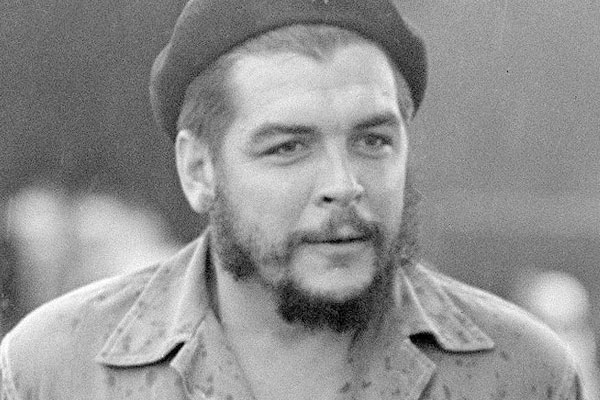
We need to organise and work in order to advance the consciousness of the masses, building a mass and powerful left communist opposition. We need to explain that, although the official discourse about “communism” distorts what communism actually needs to be, a capitalist victory will mean a deprived, crushed and gagged Cuba, without any political freedom, basic democratic rights or any sign of equality. It would be a savage setback and retreat, which would fill a small minority of new millionaires with riches, wealth and privilege, but would only offer misery and oppression the immense majority.
Only a genuine regime of working-class democracy, and the extension of the revolution to the Latin American continent, can face the peril of capitalist restoration and give a definite triumph to socialism.






